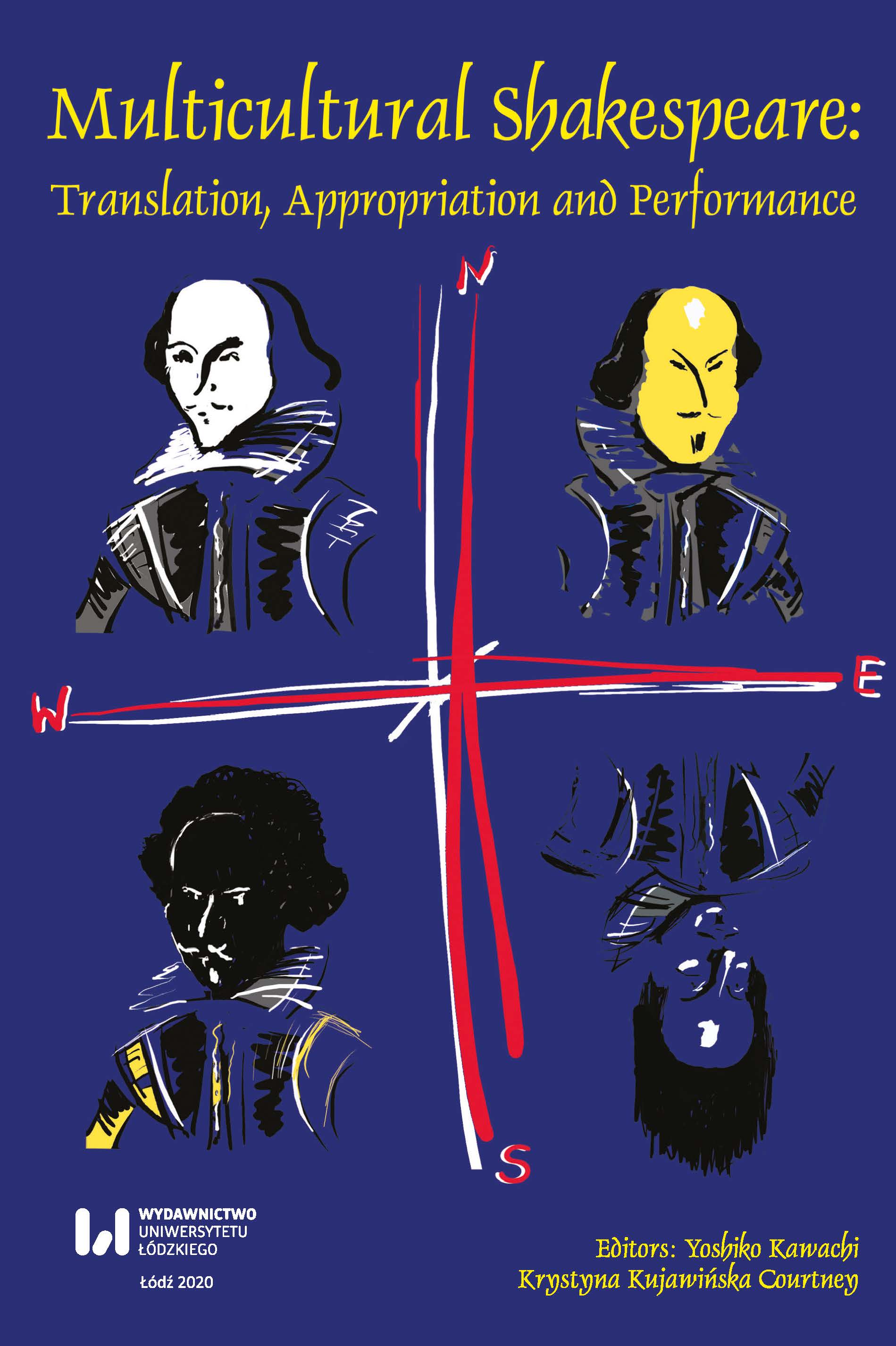Othello in the Balkans: Performing Race Rhetoric on the Albanian Stage
DOI:
https://doi.org/10.18778/2083-8530.22.08Keywords:
Othello, Albania, race, ethnicity, rhetoric, blackface, performanceAbstract
This essay examines the racialized rhetoric in Fan Noli’s 1916 Othello translation and the racialized performance techniques employed in A.J. Ricko’s 1953 National Theatre of Albania production. Hoping to combat racial discrimination in Albania, Noli’s translation of Othello renders the Moor an exceptional Turk whose alienation in Venice was designed to mirror the Albanophobic experiences of Albanian immigrants. Moreover, the Albanian Othello can serve as a platform for addressing ethno-racial tensions between Albanians and Turks, northern and southern Albanians, and Albanians of color and white Albanians. Both Noli and Ricko believed there was an anti-racist power inherent within Shakespeare’s play. In the end, however, the race-based rhetoric in the Albanian language, the use of blackface make-up in performance, and the logic and rhetoric of Shakespeare’s play itself challenged these lofty goals for race-healing.
Downloads
References
Austin, Robert. “Less is More: Towards a Sustainable and Reliable Media in Albania.” Ed. Marta Dyczok et al. Media, Democracy and Freedom: The Post-Communist Experience. Switzerland: Peter Lang, 2009.
Google Scholar
Bancroft, Angus. Roma and Gypsy-Travellers in Europe: Modernity, Race, Space, and Exclusion. Burlington: Ashgate, 2005.
Google Scholar
Barthelemy, Anthony Gerard. Black Face, Maligned Race: The Representation of Blacks in English Drama from Shakespeare to Southern. London: Louisiana State University Press, 1987.
Google Scholar
Belluscio, Gjovani and Flora Koleci.“Veçori gramatikore dhe strategji origjinale në përkthimin e “Othellos” së Fan Nolit nga anglishtja.” Fan S. Noli me 130 vjetorin e lindjes 1882-2012: Konferenca Shkencore Ndërkombëtare. Korçë: Fakulteti i Edukimit dhe Filologjisë, 2012. 232-244.
Google Scholar
Bhattacharji, Shobhana. “‘I Like the Albanians Much’: Byron and Three Twentieth-Century British Travellers to Albania.” The Byron Journal 38, no. 1, (2010): 39-48.
Google Scholar
DOI: https://doi.org/10.3828/bj.2010.7
Blumi, Isa. “The Commodification of Otherness and the Ethnic Unit in the Balkans: How to Think about Albanians.” East European Politics and Societies 12, no. 3 (1998): 527-569.
Google Scholar
DOI: https://doi.org/10.1177/0888325498012003006
Callaghan, Dympna. Shakespeare without Women: Representing Gender and Race on the Renaissance Stage. London: Routledge, 2000.
Google Scholar
Canka, Mustafa. “Only Memories and Emptiness Remain: The History of Ulcinj’s Afro-Albanian Community in Montenegro.” LeftEast, 2013. https://www.criticatac.ro/lefteast/only-memories-and-emptiness-remain-the-history-of-ulcinjs-afro-albanian-community-in-montenegro/
Google Scholar
“Committee on the Elimination of Racial Discrimination Considers the Report of Albania.” OHCHR, Geneva, 2018. https://www.ohchr.org/EN/NewsEvents/Pages/DisplayNews.aspx?NewsID=23976&LangID=E
Google Scholar
Czajka, Agnes and Jennifer Suchland. “Mapping the Margins of Europe: Race, Migration, and Belonging.” PhiloSOPHIA 7, no. 2 (2017): 205-214.
Google Scholar
DOI: https://doi.org/10.1353/phi.2017.0021
De Waal, Clarissa. Albania Today: A Portrait of Post-Communist Turbulence. London: I. B. Tauris, 2005.
Google Scholar
DOI: https://doi.org/10.5040/9780755619740
El-Tayeb, Fatima. European Others: Queering Ethnicity in Postnational Europe. Minneapolis: University of Minnesota Press, 2011.
Google Scholar
DOI: https://doi.org/10.5749/minnesota/9780816670154.001.0001
Goldberg David. “Racial Europeanization.” Ethnic and Racial Studies 29, no. 2 (2006): 331-364.
Google Scholar
DOI: https://doi.org/10.1080/01419870500465611
Hall, Kim F. Things of Darkness: Economies of Race and Gender in Early Modern England. Ithaca: Cornell University Press, 1995.
Google Scholar
DOI: https://doi.org/10.7591/9781501725456
Heng, Geraldine. The Invention of Race in the European Middle Ages. New York: Cambridge University Press, 2019.
Google Scholar
DOI: https://doi.org/10.1017/9781108381710
Hoti, Alma. “Racial Discirmination in Albania and The Role of the Commissioner of Protection Against Discrimination (CPD) Analysis of Cases of Racial Discrimination Time Period 2010-2014.” Global Journal of Politics and Law Research 3, no.6 (2015): 67-95.
Google Scholar
Kadija, Refik. “William Shakespeare in Albania.” Linguistic and Communicative Performance 2, no.1 (2009): 36-43.
Google Scholar
Lemon, Alaina. “Without a ‘Concept’? Race as Discursive Practice.” Slavic Review 61, no. 1 (2002): 54-61.
Google Scholar
DOI: https://doi.org/10.2307/2696981
Lubonja, Fatos. “Albania After Isolation: The Transformation of Public Perceptions of the West.” Ed. Andrew Hammond. The Balkans and the West: Constructing the European Other, 1945-2003. England: Routledge, 2004.
Google Scholar
Mudure, Mihaela. “Blackening Gypsy Slavery: The Romanian Case.” Ed. Raphael-Hernandez. Blackening Europe: The African American Presence. New York: Routledge, 2004.
Google Scholar
Noli, Fan Stylian. Trans. Tragjedia e Othello's Arapit Te Venetikut (1604). Boston: VATRA, 1916.
Google Scholar
Ohueri, Chelsea W. “Mapping Race and Belonging in the Margins of Europe: Albanian, Romani, and Egyptian Sentiments.” Diss. University of Texas at Austin, 2016.
Google Scholar
Qafleshi, Enkelena Shockett. “How Shakespeare Was Received in the Albanian Literture and Culture – a General History.” Linguistic and Literary Broad Research and Innovation 3, no. 1 & 2 (2014): 42-56.
Google Scholar
Qafleshi, Enkelena. Rikthim Tek Shekspiri: Studim Monografik. Tirana: Geeer, 2008. Sauter, Willmar. “Thirty Years of Reception Studies: Empirical, Methodological and Theoretical Advances.” About Performance 10, no. 1 (2010): 241-263.
Google Scholar
Schwandner-Sievers, Stephanie. “Albanians, Albanianism and the Strategic Subversion of Stereotypes.” Ed. Andrew Hammond. The Balkans and the West: Constructing the European Other, 1945-2003. England: Routledge, 2004.
Google Scholar
Shakespeare, William. Othello. The Arden Shakespeare. Third Series. Rpt. Ed. E.A.J. Honigmann. New York: Bloomsbury, 2016.
Google Scholar
Smith, Ian. “White Skin, Black Masks: Racial Cross-Dressing on the Early Modern Stage.” Renaissance Drama 32 no.1 (2003): 33-67.
Google Scholar
DOI: https://doi.org/10.1086/rd.32.41917375
Thompson, Ayanna. Colorblind Shakespeare: New Perspectives on Race and Performance. New York: Routledge, 2006.
Google Scholar
DOI: https://doi.org/10.4324/9780203944332
Thompson, Ayanna. Performing Race and Torture on the Early Modern Stage. New York: Routledge, 2008.
Google Scholar
Todorova, Mari︠i︡a Nikolaeva. Imagining the Balkans. Oxford: Oxford University Press, 1997.
Google Scholar
Downloads
Published
How to Cite
Issue
Section
License

This work is licensed under a Creative Commons Attribution-NonCommercial-NoDerivatives 4.0 International License.












